Microsoft Azure ExpressRoute is a service that allows customers to extend their on-premise network to the cloud. By connecting to Microsoft Clouds, ExpressRoute provides users access to Microsoft services. (cloud products e.g. Microsoft Azure, Microsoft dynamics 365, and Office 365)
The topics covered in this blog are:
- What is Microsoft Azure ExpressRoute?
- How does the Azure ExpressRoute work?
- Azure ExpressRoute Connectivity Models
- Benefits of Microsoft Azure ExpressRoute
- Features of Microsoft Azure ExpressRoute
- Azure ExpressRoute Setup Step by Step
- Azure ExpressRoute pricing and Billing
- Conclusion
- FAQs
What is Microsoft Azure ExpressRoute?
Azure ExpressRoute gives you access to your company’s data while it is in the cloud over a private connection with help from some of Microsoft’s strongest partners who will help you get set up. By utilizing ExpressRoute, you can meet the needs of your business by connecting to Microsoft Azure and Microsoft 365 as well as Microsoft’s other cloud services.
Connectivity can be developed from an any-to-any (IP VPN) network, a point-to-point Ethernet network, or a virtual cross-connection through a connectivity provider at a colocation facility. This allows for more reliability and faster speeds compared to typical Internet connections with consistent latency and security is also improved.
How does the Azure ExpressRoute work?
There are several things that companies can gain from the cloud but for security reasons, it’s best if the data is owned and stored locally instead of in the cloud. By using Azure ExpressRoute, not only are you reducing your security footprint but you can also connect to Microsoft’s cloud service via more reliable connections with faster transfer speeds.

Azure ExpressRoute also has pricing options so customers can tailor their needs without compromising on customizations or service levels.
- ExpressRoute service allows users to connect and gain access to Microsoft’s cloud infrastructure by extending their existing private networks to Microsoft through the use of several methods described below. Connections are made through a partner-controlled router. You can extend your existing on-premises or hybrid infrastructure into Microsoft Azure, which gives you access to resources built in a variety of ways: VM Scale Sets, Compute, D2D, Storage, etc.
- ExpressRoute is used to connect a virtual network with your Azure VNet using either an endpoint or a Microsoft edge router. An ExpressRoute connection typically provides lower latency and higher security than a traditional router connection to Azure, enabling high-performance workloads such as analytics, voice/video communications, and other real-time services to transfer data offsite by extending your on-premises network through Azure.
- These connections that form between on-premises networks and virtual networks are called circuits. A circuit is a means of transmitting data via ExpressRoute provider’s edge routers to Microsoft Edge routers.
- When an on-premise business has a network that is connected to ExpressRoutes provider’s edge router, this router acts as the gateway between Microsoft Cloud and the business’s network. Users connect their in-house network to the ExpressRoute Providers edge routers and this router acts as an entry point for Microsoft Cloud.
Check Out: Top 30 Azure Data Factory Interview Questions.
Azure ExpressRoute Connectivity Models
You can connect your on-premises network to the Microsoft Cloud in several ways. You can use Cloud Exchange Co-Locations, Point-to-Point Ethernet Connections, Any-to-Any IPVPN Connections, or ExpressRoute Direct. Each connectivity model works slightly differently and you’re best off picking one that suits your business.
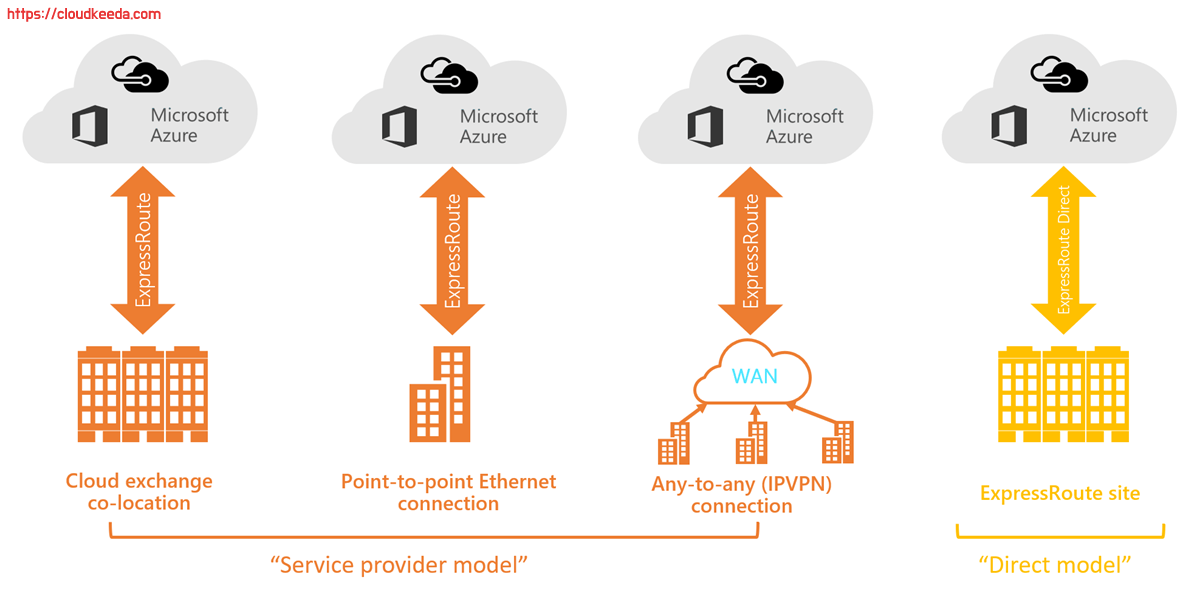
Co-located at a Cloud Exchange
Microsoft offers several managed and unmanaged encloudment services including dedicated hosting, virtualized cloud systems, video on demand (VOD) solutions integration, instant messaging applications, and much more. Managed enCloudment Service Providers such as co-location facilities (as mentioned above) can help you connect these cloud-based dependencies in your internal environment with an external network resource such as Microsoft’s infrastructure.
Point-to-Point Ethernet Connections
You can connect your on-premises data centers/offices to the Microsoft cloud through point-to-point Ethernet links provided by AWE Management. These providers can offer Layer 2 connections or managed Layer 3 connections between your site and the Microsoft cloud.
Any-to-Any (IPVPN) Networks
You can integrate your WAN with the Microsoft cloud. IPVPN providers enable any-to-any connectivity between your datacenters and branch offices. The Microsoft cloud can be joined to your WAN to make it seem exactly like any other branch office. WAN service providers often provide managed Layer 3 connections. All of the ExpressRoute capabilities and features are the same across all of the connectivity models listed above.
Direct from ExpressRoute sites
You may connect directly into Microsoft’s worldwide network at a peering point strategically distributed around the globe. ExpressRoute Direct provides dual 100 Gbps or 10-Gbps bandwidth, which allows Active/Active connectivity at scale.
Also Read: Our blog post on Azure Certification Path 2023.
Benefits of Microsoft Azure ExpressRoute
- Express Route is a service that allows organizations to connect their on-premises network with Microsoft’s global network of cloud services and enables customers to extend both their private cloud, often built on Windows Server, as well as public clouds such as Azure into their enterprise.
- Azure ExpressRoute is a service for enterprises to establish direct connections between their local network and the Microsoft Azure cloud over a dedicated, private connection facilitated by a single provider.
- It supports Business Skype.
- Express route improves security and privacy by protecting sensitive traffic against breaches that are commonly exploited on the public internet.
- Express routes are one of the most reliable ways to deliver your items with speed in mind. Express delivery incorporates several strategies that maximize its overall reliability, one of which is redundancy.
Features of Microsoft Azure ExpressRoute
Redundancy – Each ExpressRoute circuit consists of two connections to two PowerShell Direct enabled MSEEs at an ExpressRoute Location from the connectivity provider/your network edge. Microsoft requires that connections be established using PowerShell Direct, which is designed to ensure that redundant links exist between user-defined networks and VPN devices. Connectivity providers are required to meet stringent validation criteria for a deployment to be deemed acceptable for Azure services load balancing purposes.
Connectivity to all regions within a Geopolitical region – You can connect your private network to Microsoft in one of our peering locations. Once connected, you’ll have access to all Microsoft cloud services hosted within the corresponding region.
Global connectivity with ExpressRoute Premium – By enabling ExpressRoute Premium you can extend connectivity to other areas across international geopolitical lines. For instance, if you connect to Microsoft in Amsterdam through ExpressRoute your organization will gain access to all Microsoft cloud services hosted in all areas of the world. You can not only connect to South and Central American clouds but any region across the globe.
Read More: About Azure Bastion.
Azure ExpressRoute Setup Step by Step
1. Login into the Azure Portal.
Note: If you don’t have a Microsoft Azure account then check out this blog on how to create Microsoft Azure free account.
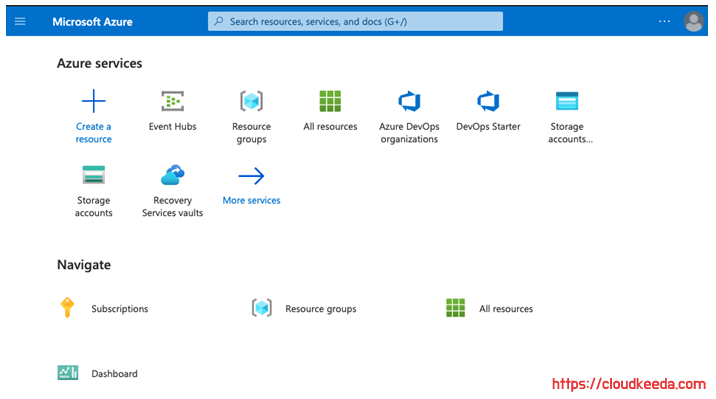
2. Click on the “+” icon to create a new resource.
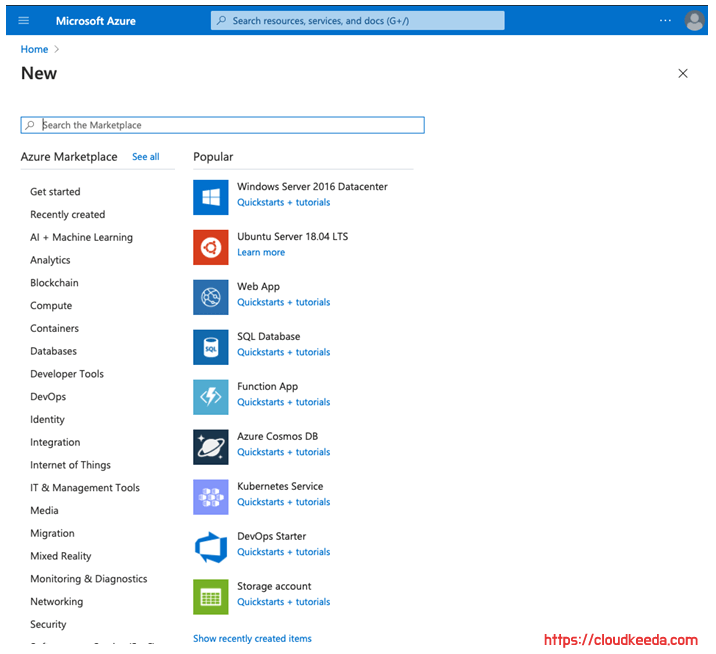
3. Click on Networking and then pick To create ExpressRoute Circuit from the right sidebar.
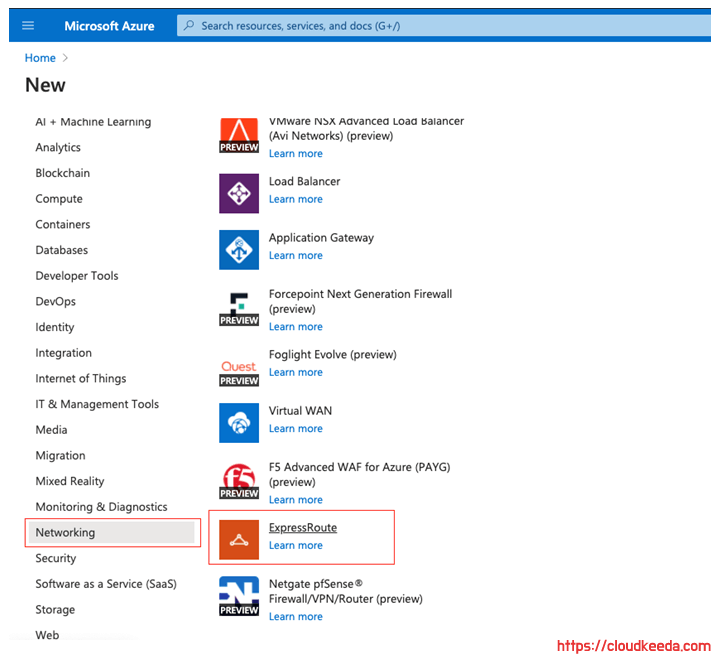
4. From the Create ExpressRoute page select the required details.
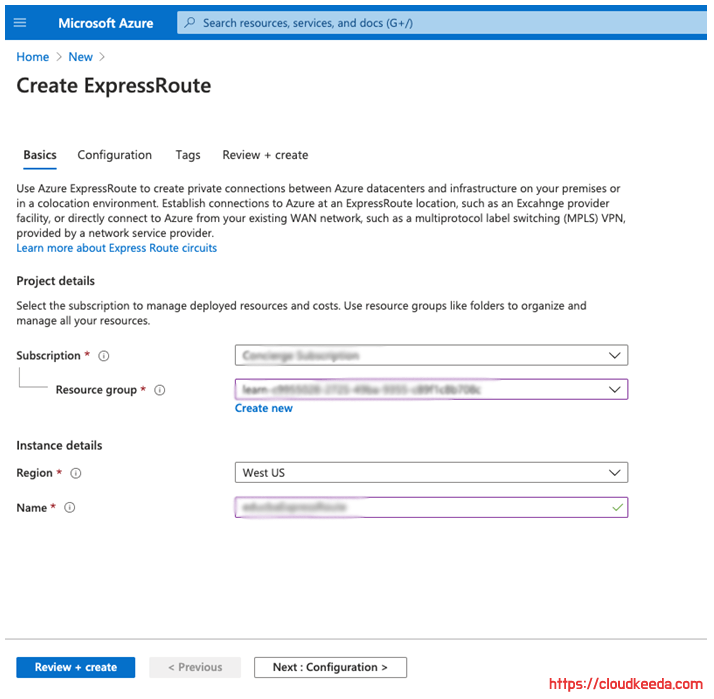
5. Then click on the Next button and enter the configuration details.
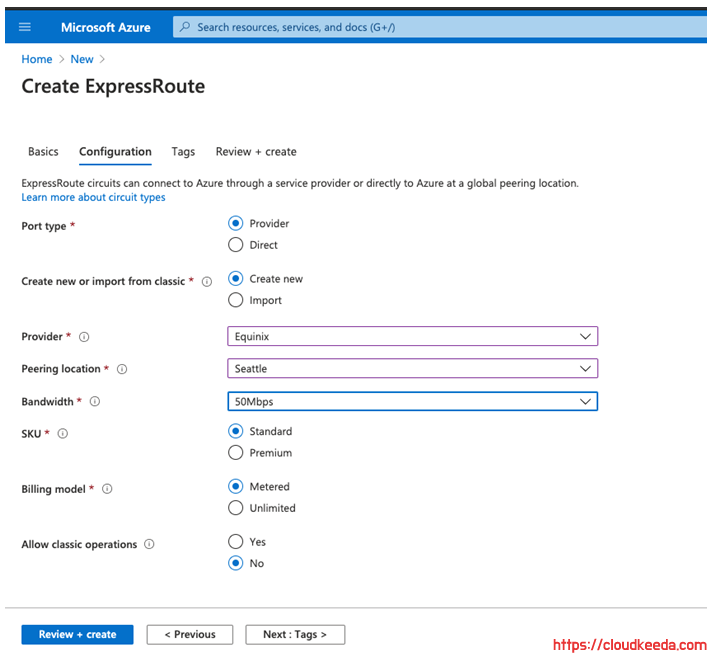
6. Now click on the Review+create button and validate that entered details.
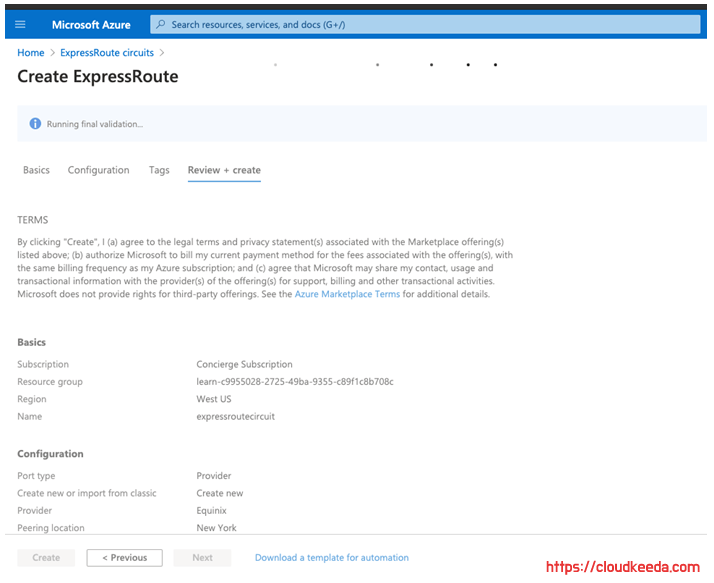
7. Azure will start installing a new ExpressRoute Azure circuit and will build a new ExpressRoute.
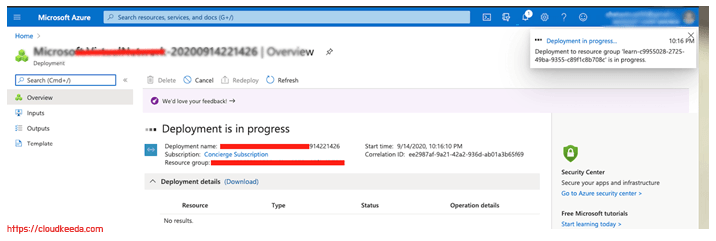
8. Users can set up the on-premise or Virtual network to the ExpressRoute defined above as required.
Also Check: Our blog post on Azure Sentinel.
Azure ExpressRoute pricing and Billing
ExpressRoute offers both metered and unlimited data plans. For the former plan, outbound data transfers are free whereas inbound data transfers are charged, whereas for the latter plan both outbound and inbound transports are charged. Prices are different for different regions.
In metered and unlimited plans, ExpressRoute provides local and premium tiers as well as a standard tier in the unlimited plan. For Zone 1, which includes the US, Canada, parts of Europe, etc., the pricing is based on circuit bandwidth which ranges from $55 per month for 50 Mbps in the local tier to $6,400 per month for 10 Gbps in the premium tier.
For Zone 2, which includes East Asia, Central India, East Japan, South India, West India, and the United States of America among others, the pricing in a metered data plan based on circuit bandwidth scales from ₹3,962.49 per month for 50 Mbps in the local tier to ₹4,61,089.664 per month for 10 Gbps in the premium tier.
Check Out: Official Pricing Document
Conclusion
The way that organizations attempt to secure their connection to the cloud is essential for any business. In these modern times, it’s not safe and prudent to trust what can sometimes seem like a public network while relying on workflows being transferred between the cloud and your on-premises infrastructure.
Azure ExpressRoute offers a feasible solution to this very common problem by providing multiple connectivity options that cover such needs as high availability, low latency, security safeguards, and keep costs down among other things so you’re not only paying for your Azure ExpressRoute service but you still have access to features and services offered by Microsoft outside of Azure ExpressRoute as well.
FAQs
Q1. What is ExpressRoute vs VPN?
ExpressRoute is a private and dedicated connection between your on-premises network and Microsoft Azure, providing faster and more reliable access to Azure services compared to a regular internet connection. It bypasses the public internet for enhanced security and offers higher bandwidth and lower latency. On the other hand, a VPN (Virtual Private Network) creates an encrypted tunnel over the internet, allowing secure remote access to Azure resources but typically with less dedicated bandwidth and potential latency compared to ExpressRoute.
Q2. What is the difference between Azure Direct Connect and ExpressRoute?
Azure Direct Connect does not exist as a specific service. It is likely a reference to a direct connection between your on-premises network and Azure, which is commonly achieved through Azure ExpressRoute. ExpressRoute provides a private, dedicated, and secure connection to Azure, bypassing the public internet. It is the primary service used for establishing direct connectivity to Azure.
Q3. Can I use Azure ExpressRoute for connecting to all Azure services?
Azure ExpressRoute supports connectivity to various Azure services, including Azure Virtual Networks, Azure Storage, Azure SQL Database, Azure Kubernetes Service (AKS), Azure Data Lake, and more. However, it’s important to review the Azure ExpressRoute documentation to ensure specific services or features are supported over ExpressRoute.
Q4. What are the benefits of using Azure ExpressRoute?
Azure ExpressRoute offers several benefits, including enhanced security through private connectivity, improved performance with low-latency connections, increased reliability with SLA-backed connections, and better control over network traffic for improved data privacy and compliance.
Q5. What is Azure ExpressRoute, and how does it differ from a regular internet connection?
Azure ExpressRoute is a private and dedicated connection between your on-premises network and Microsoft Azure. It provides a more reliable, faster, and secure connection compared to a regular internet connection. ExpressRoute bypasses the public internet, offering higher bandwidth and lower latency for accessing Azure services.

